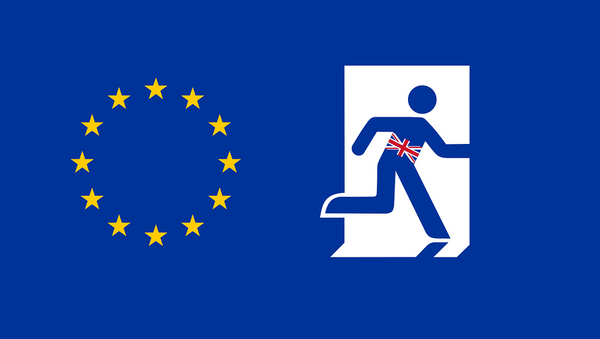In a conversation with Radio Sputnik, Michael Danson, professor of enterprise policy and director of doctoral programs at Heriot-Watt University in Edinburgh, said that the UK government is in a challenging position, but many of its problems are self-inflicted.
Sputnik: It's been a challenging five months for the prime minister since the general election debacle in the summer. Could you give us an overview of the current situation at Westminster, with regard to the ongoing divorce and negotiation with the EU?
Michael Danson: It goes back decades, in fact. The Conservative Party, at the moment the biggest party in the House of Commons, has been split over the EU for a long time. There were some who were very reluctant to go in in the first place and even those who were in favor of going in, many of them thought it should just be about trade rather than being about this big European project of closer unions in other spheres.
The way that the Conservative Party has handled its relationship with Europe is reflected in the way many people, particularly in England relate to the EU and this has come to the surface repeatedly over the years.

Nicknamed the "Iron Lady," Margaret Thatcher was UK Prime Minister from 1979 to 1990. Britain's first female prime minister, she fought a series of battles with Brussels over the form of the European project and the UK's contributions to the then European Economic Community (EEC); in 1984 she successfully negotiated a rebate for the UK's contributions to the EU budget. However, her Euroscepticism was unpopular with some more pro-European Conservative MP's. In 1990, Thatcher rejected the European Commission's plans to change the constitution of the EEC. President of the European Commission Jacques Delors proposed to make the commission the executive of the community, to make the Council of Ministers the senate and the European Parliament its democratic body. On October 30, in a House of Commons debate, Thatcher exclaimed, "No, No, No!" to the proposals. Two days later, her deputy Prime Minister Geoffrey Howe resigned, the trigger of a chain of events which led to a leadership contest and her resignation on November 22, 1990.
Sputnik: The Brexit talks have been going on since June but we don't seem to be moving forward. Is it going to be a last-minute event, where everything is finalized in March 2019, burning the midnight oil?
Michael Danson: It's actually very difficult to know. It's still unclear what the British negotiating position is on many of these issues and other areas. There is a denial, as there has always been, from many in British society, including in the ruling Conservative Party, to understand what it means to be a member of this club, the EU. We helped to write many of the rules and regulations for new members, but also for members who leave.
So, Britain was very instrumental in what exit negotiations would look like. They're now in denial across many of these areas and say, "We'll just move on in some aspects." But the rules are clear that no, you have to settle on those fundamental issues that you've just outlined.
Trade, for instance, has been a European Union matter as a whole, the European Union negotiates trade agreements with other parts of the world on behalf of all its member states. Because of that, Britain doesn't have trade negotiators. It doesn't have the skills, the knowledge, the information necessary to undertake the next set of negotiations after the Brexit principles are agreed.

There has been a lack of realism about how much we would have to pay. We have ongoing obligations as a member, this isn't like a football or golf club where you give up membership and walk away. We are actually responsible for paying pensions of Britons and others who've worked for the European Union. We have long-term projects and programs that Britain has benefited from and some of those will continue post-Brexit, we should still be paying for them and so on.

Sputnik: In the future, how do you think historians will review this vitally important political and economic chapter in the UK's history: the period of Brexit negotiation, the prime minister's governance, the political positioning that has gone on?
Michael Danson: I think they will see it as being the most damaging period in the UK's history, for the next 200 years if not more, where there was a lack of leadership from the top, a real failure to lay out the consequences of a Brexit vote, of leaving the European Union.
The European Union has got many issues; I think it's badly wrong on Catalonia, for instance, its interference there. However, it also has many benefits for the European economy and the British economy, as well as for British society. We've also seen a lot of liberalization in terms of social norms and values across the European Union. Yes, in the West but also in the East. So, the new member states of Eastern and Central Europe have undoubtedly benefited greatly by being with and mixing with many parts of Western Europe.
It reduces Britain's influence in the world, it reduces our influence within Europe and beyond. We will just continue to see this long-term relative decline of Britain, of the UK, and I would fully expect Scotland to become independent over that period, probably Ireland to reunite. It would leave a rump of England and maybe Wales, looking at itself and thinking, "Why on Earth did we start down this path?"


